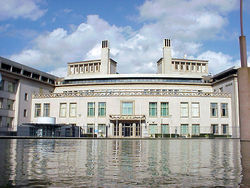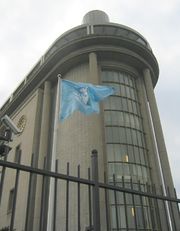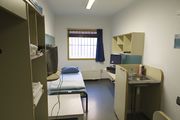International Criminal Tribunal for the former Yugoslavia
| International Criminal Tribunal for the former Yugoslavia |
|
|---|---|
 The Tribunal building in The Hague |
|
| Established | 25 May 1993 |
| Jurisdiction | former Yugoslavia |
| Location | The Hague, the Netherlands |
| Authorized by | United Nations Security Council Resolution 827 |
| Judge term length | Four years |
| Number of positions | 16 permanent 12 ad litem |
| Website | http://www.icty.org/ |
| President | |
| Currently | Patrick Lipton Robinson (Jamaica) |
| Since | 17 November 2008 |
| Jurist term ends | 2010 |
The International Tribunal for the Prosecution of Persons Responsible for Serious Violations of International Humanitarian Law Committed in the Territory of the Former Yugoslavia since 1991, more commonly referred to as the International Criminal Tribunal for the former Yugoslavia or ICTY, is a body of the United Nations established to prosecute serious crimes committed during the wars in the former Yugoslavia, and to try their perpetrators. The tribunal is an ad hoc court which is located in The Hague, the Netherlands.
The Court was established by Resolution 827 of the United Nations Security Council, which was passed on 25 May 1993. It has jurisdiction over four clusters of crime committed on the territory of the former Yugoslavia since 1991: grave breaches of the Geneva Conventions, violations of the laws or customs of war, genocide, and crime against humanity. The maximum sentence it can impose is life imprisonment. Various countries have signed agreements with the UN to carry out custodial sentences. The last indictment was issued 15 March 2004. The Tribunal aims to complete all trials by the middle of 2011 and all appeals by 2013, with the exception of Radovan Karadžić whose trial is expected to end in 2012 and the appeal to be heard by February 2014.[1]. Ratko Mladić and Goran Hadžić have been charged, however are still at large and thus do not fall within the court's completion strategy[2].
The International Criminal Tribunal for the former Yugoslavia should not be confused with the International Criminal Court and the International Court of Justice; both courts are also based in The Hague, but have a permanent status and different jurisdictions.
Contents |
History
The Court was originally proposed by German Foreign Minister Klaus Kinkel.[3]
Organization
The Tribunal employs around 1,200 staff. Its organisational components are Chambers, Registry and the Office of the Prosecutor (OTP).

Chambers encompasses the judges and their aides. The Tribunal operates three Trial Chambers and one Appeals Chamber. The President of the Tribunal is also the presiding Judge of the Appeals Chamber. Currently, this is Patrick Lipton Robinson of Jamaica (since 2008). His predecessors were Antonio Cassese of Italy (1993–1997), Gabrielle Kirk McDonald of the United States (1997–1999), Claude Jorda of France (1999–2002), Theodor Meron of the United States (2002–2005), Fausto Pocar of Italy (2005-2008).
The Registry is responsible for handling the administration of the Tribunal; activities include keeping court records, translating court documents, transporting and accommodating those who appear to testify, operating the Public Information Section, and such general duties as payroll administration, personnel management and procurement. It is also responsible for the Detention Unit for indictees being held during their trial and the Legal Aid program for indictees who cannot pay for their own defence. It is headed by the Registrar, currently John Hocking of Australia (since May 2009). His predecessors were Hans Holthuis of the Netherlands (2001–2009), Dorothée de Sampayo Garrido-Nijgh of the Netherlands (1995–2000), and Theo van Boven of the Netherlands (February 1994 to December 1994).
The Office of the Prosecutor (OTP) is responsible for investigating crimes, gathering evidence and prosecuting indictees. It is headed by the Prosecutor, Serge Brammertz. Previous Prosecutors have been Ramón Escovar Salom of Venezuela (1993–1994), Richard Goldstone of South Africa (1994–1996), Louise Arbour of Canada (1996–1999), Eric Östberg of Sweden, and Carla Del Ponte of Switzerland (1999–2007), who until 2003, simultaneously served as the Prosecutor of the International Criminal Tribunal for Rwanda where she led the OTP since 1999.
Judges
There are 16 permanent judges and 12 ad litem judges who serve on the tribunal. They are elected to four-year terms by the UN General Assembly. They can be re-elected.
On 17 November 2008, Judge Patrick Lipton Robinson (Jamaica) was elected as the new President of the ICTY by the permanent judges in an Extraordinary Plenary Session. Judge O-Gon Kwon (South Korea) was elected as the new Vice-President.[4]
| Name | Country | Position | Elected | Term Ends |
|---|---|---|---|---|
| Fausto Pocar | Judge | 2001 | 2009 | |
| Kevin Parker | Judge | 2003 | 2009 | |
| Patrick Lipton Robinson | President | 1998 | 2010 | |
| Carmel A. Agius | Presiding Judge | 2001 | 2007 | |
| Alphonsus Martinus Maria Orie | Presiding Judge | 2001 | 2007 | |
| Mohamed Shahabuddeen | Judge | 1997 | 2009 | |
| Mehmet Güney | Judge | 2001 | 2007 | |
| Liu Daqun | Judge | 2000 | 2012 | |
| Andresia Vaz | Judge | 2005 | 2011 | |
| Theodor Meron | Judge | 2001 | 2007 | |
| Wolfgang Schomburg | Judge | 2001 | 2007 | |
| O-Gon Kwon | Vice-President | 2001 | 2007 | |
| Jean-Claude Antonetti | Judge | 2003 | 2009 | |
| Howard Morrison CBE | Judge | 2009 | 2012 | |
| Christine Van Den Wyngaert | Judge | 2003 | 2009 | |
| Bakone Justice Moloto | Judge | 2005 | 2011 | |
| Krister Thelin | Ad Litem Judge | 2003 | 2009 | |
| Janet M. Nosworthy | Ad Litem Judge | 2005 | 2011 | |
| Frank Hoepfel | Ad Litem Judge | 2005 | 2011 | |
| Árpád Prandler | Ad Litem Judge | 2006 | 2012 | |
| Stefan Trechsel | Ad Litem Judge | 2006 | 2012 | |
| Antoine Kesia-Mbe Mindua | Ad Litem Judge | 2006 | 2012 | |
| Ali Nawaz Chowhan | Ad Litem Judge | 2006 | 2012 | |
| Tsvetana Kamenova | Ad Litem Judge | 2006 | 2012 | |
| Kimberly Prost | Ad Litem Judge | 2006 | 2010 | |
| Ole Bjørn Støle | Ad Litem Judge | 2006 | 2010 | |
| Frederik Harhoff | Ad Litem Judge | 2007 | 2013 | |
| Flavia Lattanzi | Ad Litem Judge | 2007 | 2013 |
List of judges provided on Organs of the Tribunal at: http://www.icty.org/sid/151
Detention facilities

Photograph provided courtesy of the ICTY.
Those defendants on trial and those who were denied a provisional release are detained at the United Nations Detention Unit on the premises of the Penitentiary Institution Haaglanden, location Scheveningen, located some 3 km by road from the courthouse.
The indicted are housed in private cells which have a toilet, shower, radio, satellite TV, personal computer (without Internet access) and other comforts. They are allowed to phone family and friends daily and can have conjugal visits. There is also a library, a gym and various rooms used for religious observances. The inmates are allowed to cook for themselves. All of the inmates mix freely and are not segregated on the basis of nationality; Serbian and Bosnian Muslim detainees (once mortal enemies) now reportedly share friendly chess and backgammon games and watch film screenings. As the cells are more akin to a university residence instead of a jail, some has derisively referred to the ICT as the “Hague Hilton”.[5]
The reason for this luxury relative to other prisons is that the first president of the court wanted to emphasise that the indictees are innocent until proven guilty.[6]
Activity
Accomplishments
In 2004, the ICTY published a list of five successes which it claimed it had accomplished:[7]
- "Spearheading the shift from impunity to accountability", pointing out that, until very recently, it was the only court judging crimes committed as part of the Yugoslav conflict, since prosecutors in the former Yugoslavia were, as a rule, reluctant to prosecute such crimes;
- "Establishing the facts", highlighting the extensive evidence-gathering and lengthy findings of fact that Tribunal judgments produced;
- "Bringing justice to thousands of victims and giving them a voice", pointing out the large number of witnesses that had been brought before the Tribunal;
- "The accomplishments in international law", describing the fleshing out of several international criminal law concepts which had not been ruled on since the Nuremberg Trials;
- "Strengthening the Rule of Law", referring to the Tribunal's role in promoting the use of international standards in war crimes prosecutions by former Yugoslav republics.
For more information see: ICTY at a glance
Indictees
Since the very first hearing (referral request in the Tadić case) on 8 November, 1994, the Tribunal has indicted 161 individuals, and has already completed proceedings with regard to 100 of them: five have been acquitted, 48 sentenced (seven are awaiting transfer, 24 have been transferred, 16 have served their term, and one died while serving his sentence), 11 have had their cases transferred to local courts. Another 36 cases have been terminated (either because indictments were withdrawn or because the accused died, before or after transfer to the Tribunal).
As of November 2008, there were eight ongoing trials and a further four cases in the pre-trial stage. Ten further cases are at the appeals stage and two accused, Ratko Mladić and Goran Hadžić, are still at large.[8]
The accused currently at the appeals stage include Sefer Halilović, Fatmir Limaj and Isak Musliu (who have been acquitted and released but against whom an appeal by the Office of the Prosecutor is running), as well as Amir Kubura and Naser Orić. These two accused have been sentenced and granted early release (Kubura) and release (Orić), but the OTP has appealed against the Trial Chamber's Judgements.
A further 19 individuals have also been the subject of contempt proceedings.[9]
The indictees ranged from common soldiers to generals and police commanders all the way to Prime Ministers. Slobodan Milošević was the first sitting head of state indicted for war crimes.[10] Other "high level" indictees included Milan Babić, President of the Republika Srpska Krajina; Ramush Haradinaj, former Prime Minister of Kosovo; Radovan Karadžić, former President of the Republika Srpska; Ratko Mladić, former Commander of the Bosnian Serb Army and Ante Gotovina, former General of the Croatian Army.
Haradinaj's trial began at The Hague on 5 March 2007[11] and the closing brief was given on 23 January 2008.[12] The final decision of the ICTY was expected in March 2008.
On 3 April 2008, ICTY issued a public notice of the Haradinaj verdict, in which he was acquitted of all charges. The judge said much of the evidence had been non-existent against Mr. Haradinaj or at best inconclusive. [13] But he also complained of witness intimidation, saying some witnesses had not testified because they had been afraid. .[14]
On 31 July 2008, Karadžić appeared in front of the judges of the tribunal.
Criticism
Criticisms levelled against the court include:
- Two key indictees are still not apprehended, which reflects badly on its image. Defenders point out that the Tribunal has no powers of arrest, and is reliant on other agencies (notably national governments, EUFOR, and KFOR) to apprehend and extradite indictees.
- Critics have questioned whether the Tribunal exacerbates tensions rather than promotes reconciliation, as is claimed by Tribunal supporters. Polls show a generally negative reaction to the Tribunal among the Serb and Croat public. The majority of Croats and Serbs doubt the tribunal's integrity and question the tenability of its legal procedures (although the Serbian and Croatian opinions on the court are almost always exactly the opposite with regard to the cases that involve both parties). Kosovo Albanians and Bosnian Muslims, on the other hand, have expressed their high regard for the court and the trust in its impartiality though these feelings change when their own individuals stand accused of atrocities against opponents.
- Critics, even within the United Nations, have complained of the Tribunal's high cost. The two-year budget for the Tribunal for 2004 and 2005 was $271,854,600 (currently $306 million)[15]. The cost is borne by all U.N. members.
- Critics have also complained of the length of trials, with some extending for several years. Supporters of the Tribunal respond that many of the defendants are charged with multiple crimes against many victims, all of which must be proven beyond reasonable doubt, thus requiring long trials. Simultaneous translation also slows trials.
- Some three-quarters of indictees thus far have been Serbs (or Montenegrins), to the extent that a sizeable portion of the Bosnian Serb and Serbian political and military leaderships have been indicted, while there have been far fewer indictments resulting from crimes committed against Serbs. Critics of the tribunal have seen this as reflecting bias, while the tribunal's defenders have seen this as indicative of the actual proportion of crimes committed.
Some of the defendants, such as Slobodan Milošević, claimed that the Court has no legal authority because it was established by the UN Security Council instead of the UN General Assembly, therefore it had not been created on a broad international basis. The Tribunal was established on the basis of Chapter VII of the United Nations Charter; the relevant portion of which reads "the Security Council can take measures to maintain or restore international peace and security". The legal criticism has been succinctly stated in a Memorandum issued by Austrian Professor Hans Köchler, which was submitted to the President of the Security Council in 1999. British Conservative Party MEP Daniel Hannan has called for the court to be abolished, claiming that it is anti-democratic and a violation of national sovereignty.[16]
See also
- Command responsibility
- Joint Criminal Enterprise
- International Criminal Court
- International Criminal Tribunal for Rwanda
- List of indictees of the International Criminal Tribunal for the former Yugoslavia
- Arrest and prosecution of Radovan Karadžić
References
- ↑ ICTY Completion Strategy
- ↑ [1]
- ↑ Hazan, Pierre. 2004. Justice in a Time of War: The True Story Behind the International Criminal Tribunal for the Former Yugoslavia. College Station: Texas A & M University Press
- ↑ Judge Robinson elected new ICTY President from Hague Justice Portal
- ↑ Evans, Judith (26 October 2009). "Radovan Karadzic cell life". The Times (London). http://www.timesonline.co.uk/tol/news/world/europe/article6891319.ece. Retrieved 5 May 2010.
- ↑ "Milosevic jail under scrutiny". BBC News. 13 March 2006. http://news.bbc.co.uk/2/hi/europe/4801626.stm. Retrieved 5 May 2010.
- ↑ 'The Tribunal's Accomplishments in Justice and Law' http://www.icty.org/x/file/Outreach/view_from_hague/jit_accomplishments_en.pdf
- ↑ Calendar of court proceedings before the ICTY: Hague Justice Portal
- ↑ UN Site
- ↑ ASIL.org
- ↑ Washington Post/Associated Press, Ex-Kosovo PM Pleads Innocent at Hague, 1 March 2007
- ↑ Closing Arguments in Haradinaj Trial
- ↑ Hague court acquits Kosovo ex-PM from BBC News
- ↑ Hague court acquits Kosovo ex-PM from BBC News
- ↑ Consumer Price Index (estimate) 1800–2008. Federal Reserve Bank of Minneapolis. Retrieved December 7, 2010.
- ↑ Hannan, Daniel (26 February 2007). "He went unsung to his grave". London: The Daily Telegraph. http://blogs.telegraph.co.uk/daniel_hannan/blog/2007/02/26/he_went_unsung_to_his_grave. Retrieved 2009-05-24.
Further reading
|
|
External links
- Official website of ICTY
- International Progress Organization: Monitoring of the ICTY
- Del Ponte, Carla (2003). The role of international criminal prosecutions in reconstructing divided communities, public lecture by Carla Del Ponte, Prosecutor, International Criminal Tribunal for the Former Yugoslavia, given at the London School of Economics, 20 October 2003.
- Topical digests of the case law of ICTR and ICTY, Human Rights Watch, 2004
- Hague Justice Portal: Academic gateway to The Hague organisations concerning international peace, justice and security.
- Calendar of court proceedings before the ICTY: Hague Justice Portal
- Why Journalists Should be Worried by the Rwanda Tribunal Precedents (deals also with ICTY) by Thierry Cruvellier for Reporters Without Borders
- SENSE News Agency, a special project based in ICTY
- Complete web-based video archive of the Milosevic trial
- War Crimes, conditionality and EU integration in the Western Balkans, by Vojin Dimitrijevic, Florence Hartmann, Dejan Jovic, Tija Memisevic, edited by Judy Batt, Jelena Obradović, Chaillot Paper No. 116, June 2009, European Union Institute for Security Studies
|
|||||||||||||||||
|
||||||||||||||||||||||||||||||||